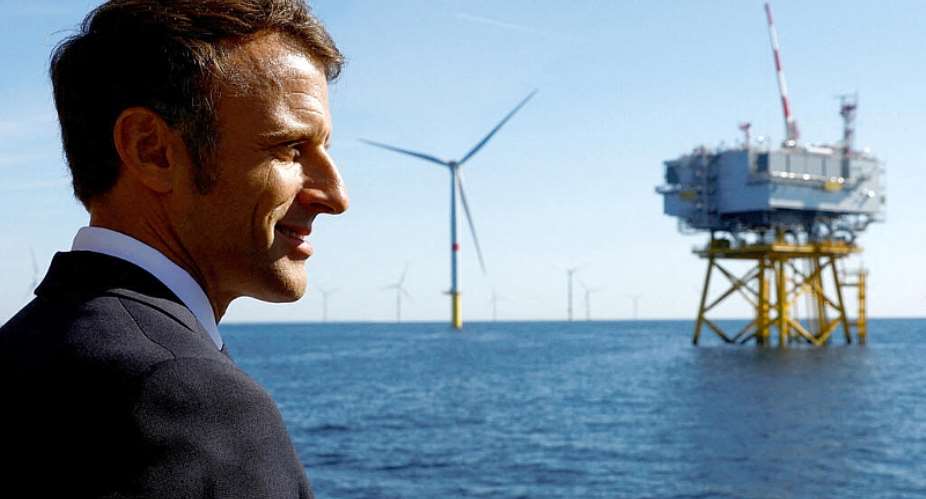French President Emmanuel Macron took to the Atlantic off the western city of Saint-Nazaire on Thursday to inaugurate the first of a planned series of offshore windfarms. The project is intended to make France less dependent on non-renewable energy and, in the shorter term, answer national needs in the wake of Russian power cuts.
The French leader promised to cut by half the administrative delays slowing renewable energy projects.
The President wants to have at least 50 offshore windfarms producing electricity by 2050. It took a decade to plan, approve and build the installation which the president inaugurated on Thursday.
"It still takes too long in France," Macron said. "We have to do it a lot quicker."
Each offshore project has to be submitted to local communities and other interest groups, as part of a complex judicial process which can take up to 12 years. Emmanuel Macron wants the entire procedure shortened to six years, the average in other European countries.
By 2050, French national electricity consumption will have risen 40 percent on today's level.
The summer drought and recent series of heatwaves have brought the question of renewable energy into sharp focus for public and politicians alike.
Power price hikes as a result of Russian retaliation for EU sanctions have underlined the need for an increased level of energy sovereignty.
The creaking and leaking nuclear sector
Many of France's ageing nuclear reactors are already past their sell-by date and need to be replaced.
The national electricity company's project to develop safer, more efficient nuclear generation has been beset by costly delays and technical setbacks.
On his visit to Saint-Nazaire, where the offshore turbines are constructed, the president also said that the nuclear sector would have to speed up the commissioning of new generation capacity.
- Why France is struggling to power through the energy crisis
- Electricity blunder costs French power company €60m
The President in February fixed a deadline of 2035 for the inauguration of six new-generation nuclear reactors. On Thursday he warned that calendar would have to be accelerated.
Many ecologists point to the dangers inherent in the use of nuclear power, and the environmental difficulties posed by the inevitable radioactive waste which must be securely stored for several thousand years.
The problem with onshore windfarms and solar-panel arrays is the people who live near them. There are proposals to site solar panels along the fringes of the nation's motorways, to limit public nuisance.
The government is to adopt detailed proposals at a cabinet meeting on Monday.





 Election 2024: Don’t be complacent, we haven’t won yet – Asiedu Nketia cautions ...
Election 2024: Don’t be complacent, we haven’t won yet – Asiedu Nketia cautions ...
 Election 2024: Stop fighting over positions in Mahama’s next govt – Asiedu Nketi...
Election 2024: Stop fighting over positions in Mahama’s next govt – Asiedu Nketi...
 Prof Jane Naana Opoku-Agyemang will restore dignity of vice presidency – Fifi Kw...
Prof Jane Naana Opoku-Agyemang will restore dignity of vice presidency – Fifi Kw...
 'Ghana beyond aid' has turned out to be 'Ghana without compass' – Naana Opoku-Ag...
'Ghana beyond aid' has turned out to be 'Ghana without compass' – Naana Opoku-Ag...
 Nation builder Mahama will deliver on his promise of a 24-hour economy for the b...
Nation builder Mahama will deliver on his promise of a 24-hour economy for the b...
 Prof Jane Naana is more than qualified to be Ghana’s first vice president and ev...
Prof Jane Naana is more than qualified to be Ghana’s first vice president and ev...
 WENDA petitions Akufo-Addo, Speaker of Parliament to make vote-buying illegal
WENDA petitions Akufo-Addo, Speaker of Parliament to make vote-buying illegal
 Supreme court declares payment of wages to spouses of President, Vice President ...
Supreme court declares payment of wages to spouses of President, Vice President ...
 Publish full KPMG report on SML-GRA contract – Bright Simons to Akufo-Addo
Publish full KPMG report on SML-GRA contract – Bright Simons to Akufo-Addo
 Kumasi International Airport to begin full operations by end of June
Kumasi International Airport to begin full operations by end of June
